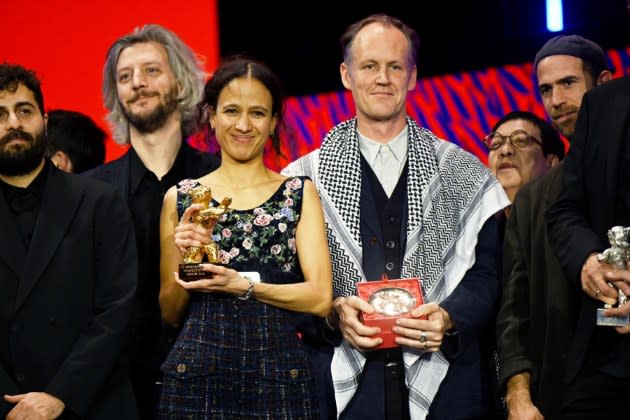Berlin Fest Advisory Board Takes Swipe at Outgoing Directors Over Award Ceremony “Antisemitism”

The Berlin Film Festival could face major changes aimed at preventing a repeat of this year’s award ceremony, where several winners criticized Israel’s conduct in the war in Gaza and expressed support for an immediate ceasefire.
The statements, which included Ben Russell, co-director of Encounters best film winner Direct Action, using the word “genocide” to describe Israeli military action in the region and Israeli filmmaker Yuval Abraham, co-director of best documentary winner No Other Land, referring to conditions for Palestinians as “apartheid,” set off a political firestorm within Germany. Prominent politicians, both left- and right-wing, branded the statements “antisemitic” and called for “consequences.”
More from The Hollywood Reporter
Netflix Signs Deal With Writers' Guild of Great Britain for Scripted Live-Action Series
Banijay Takes Stake in German TV Producer Dynamic Ally Pictures
Filmart: Japanese Anime 'Dan Da Dan' to Stream on Both Netflix, Crunchyroll
On Monday night, the advisory council for Federal Cultural Events in Berlin (KBB), the group that oversees several government-backed cultural institutions, including the Berlinale, criticized the festival and, by association, outgoing Berlinale directors Mariëtte Rissenbeek and Carlo Chatrian for not doing more to distance the festival from such Israel-critical commentary.
The Berlinale must remain a place “free from hatred, agitation, anti-Semitism, racism, anti-Muslim and every form of misanthropy,” the KBB said in a resolution published Monday evening. While festival management cannot be blamed for “the personal opinions of individual prize winners,” it said, the Berlinale needs to ensure in the future that “freedom of expression and artistic freedom within [Germany’s] constitutionally protected framework is guaranteed for guests and award winners” but that there has to be room for the festival to contextualize and reply to statements it disagrees with.
The advisory board, which includes German culture minister Claudia Roth and several federal and state-level politicians as well German Film Academy managing director Anne Leppin, also commented on the hacking of the Berlinale’s Instagram page, which resulted in unauthorized posts with such statements as “Genocide is genocide. We are all complicit” and “Free Palestine From the River to the Sea. The board called the posts “anti-Israel and antisemitic” and welcomed the action taken by Berlinale management, which has filed a criminal complaint “against unknown persons” responsible for the hack.
Roth and others have called for a strict code of conduct to govern government-backed cultural institutions in Germany, including the Berlinale, but it remains unclear how such a code could be formulated to be compatible with Germany’s free speech laws. Early this year, Berlin Senator for Culture Joe Chialo tried to add an “anti-discrimination” clause to Berlin’s public funding laws, specifically blocking funding for artists who expressed antisemitic, racist or otherwise marginalizing views but he was forced to withdraw the proposal amid artists’ protests that it would constitute illegal state censorship.
In another swipe at Rissenbeek and Chatrian, who are leaving the Berlinale to be replaced by new festival director Tricia Tuttle in April, the board said it welcomed new management which, it hoped would “build a strong leadership team” going forward.
For his part, Chatrain, in a recent post on X, called out what he said was action by the media and German politicians which “weaponizes and instrumentalizes antisemitism for political means.”
— Carlo Chatrian (@CarloChatrian) March 1, 2024
Missing from the board’s statement was self-reflection on the part of Germany’s politicians, many of whom, including Roth, attended the Berlinale award ceremony and applauded the festival winners.
Germany’s politicians should “critically reflect on their own behavior,r” said Olaf Zimmermann, managing director of the German Cultural Council, in an interview with German press agency epd. “Restricting artistic freedom is not a solution to one’s own failures.”
Best of The Hollywood Reporter
